Commentary
“The second edition of the Climate Vulnerability Monitor demonstrates with piercing clarity that it is the Least Developed Countries that have the most to lose unless we rapidly reduce greenhouse gas emissions. This report confirms many earlier scientific assessments, including from the Intergovernmental Panel On Climate Change, but adds hard economic numbers to the earlier qualitative conclusions. The International Energy Agency keeps telling us that we are running out of time to change the direction of our carbon intensive energy system if we are to keep warming below 2°C (and of any chance at below 1.5°C). And now this report shows that the Least Developed Countries too, are running out of time: what country or group of countries can accept an 8% GDP loss by 2030?”
Pa Ousman Jarju – Chair of the Least Developed Countries Group in the UN Climate Negotiations (UNFCCC)
“This report shows that climate change is already contributing to around 400,000 deaths due to hunger and communicable diseases each year. It shows that inaction on climate change will ultimately be measured in the lives lost and life chances stunted by hunger, malnutrition and a food system stretched to breaking point.”
Jeremy Hobbs – Executive Director of Oxfam International (See complete statement)
“We know there are no jobs on a dead planet. Our legacy to our children and grandchildren must be a healthy planet. Day by day we see how climate change is taking its toll on workers. Extreme weather events and rising temperatures put workers and their families under severe stress.
With 2% investment of GDP in the green economy of just 12 countries we could create 48 million jobs. Imagine what we could do in 50 countries, how many millions of jobs that would create, and how many lives that could save.
We have a once in a generation chance to promote an alternative economic model, which transforms all our industries and sectors into green ones, which provides decent work to all, and benefits workers, business, national economies and future generations.”
Sharan Burrow – General Secretary, ITUC
Climate Vulnerable Forum
“The Climate Vulnerability Monitor 2nd Ed.’s publication is a milestone for the climate negotiations. It is our hope it will help redirect efforts to effectively address the harms being done to today’s economy.”
Sheikh Hasina – Bangladesh Prime Minister
Advisory Panel
“1.3 billion people are still fighting their way out of the most extreme forms of poverty while major economies are today fighting their way out of crippling financial and economic crises. We simply cannot afford to part with more growth. The prospect of economic losses that rise with every decade could destabilize the world economy far before the worst impacts of climate change set in. Governments and international policy makers must act decisively to combat the spiralling costs to national and global GDP resulting from inaction on climate change. The Monitor shows how failure to do so has already caused unprecedented damage to the world economy and threatens human life across the globe. With the investment required to solve climate change already far below the estimated costs of inaction, no doubt remains as to the path worth taking.”
Jose María Figueres – Former President of Costa Rica; Chairman of the Carbon War Room
“This second edition of the Climate Vulnerability Monitor is the splash of cold water we desperately need to awaken us from our climate change complacency. It provides the economic justification for an immediate and bold response to the problem and highlights the terrible injustice we do to millions of the world’s poor if we fail to respond.”
Robert Glasser – Secretary General, CARE International
“The Climate Vulnerability Monitor has established itself in a very short time as a major contribution to the literature on climate vulnerability around the world and has made a significant contribution to the global policy discourse on tackling climate change.”
Saleemul Huq – Senior Fellow at the International Institute for Environment and Development
“Climate change is not just a distant threat but a present danger. Its economic impact is already with us.”
Michael Zammit Cutajar – Former Executive Secretary of the United Nations Framework Convention on Climate Change (UNFCCC)
“This report has the potential to change the way we act on climate change. If climate change is already costing 2% of global GNP, then the precautionary principle – taking action now just in case of future cost – no longer provides a good foundation for policy. Instead, it seems, there is a distinct economic case to move fast and move far in the direction of a low carbon world.”
Simon Maxwell – Executive Chair, Climate and Development Knowledge Network (CDKN)
“The Climate Vulnerability Monitor 2012 draws our attention to what we no longer can ignore, as the signs on the wall convey a clear message: Climate change is happening and impacting humanity where it is most vulnerable. It thereby confirms the shocking truth that those who have caused it the least are suffering the most.”
Hans Joachim Schellnhuber – Founding Director of the Potsdam Institute for Climate Impact Research (PIK)
Peer Review Committee
“This new version of the Climate Vulnerability Monitor has for the first time in a international assessment given due attention to the impact of increasing heat in peoples’ workplaces, whether they are poor people in farm fields or manual workers in non-cooled factories. The assessment shows that working people are vulnerable to climate change related increasing heat, because the human body creates internal heat during work, and if this cannot be emitted from the body in the hotter future environments, the body temperature will go up with potentially disastrous health consequences. To avoid such consequences, working people have to slow down and take more rest, which reduces labor productivity. This reduction can have important effects on the workers’ income and the local economic development, and it is a feature of climate change that threatens poverty reduction, particularly in hot low income countries. This human health related vulnerability has been hidden until now, but is uncovered by the Climate Vulnerability Monitor.”
Tord Kjellstrom – Professor at the National Institute of Public Health, Stockholm
“An internationally comparable vulnerability assessment is of a tremendous value, because we need to identify the most risk prone areas in order to decide where funds should invested first.”
Juergen P. Kropp – Potsdam Institute for Climate Impact Research
“The Monitor makes an important contribution to developing countries who need to plan their strategies to adapt to the impacts of climate change by presenting up-to-date mid-range estimates of the impacts of climate change for a range of economic activities. It is innovative in bringing together not just climate impacts but also providing data on the negative health and environmental impacts of the “carbon economy” itself.”
Michele de Nevers – Visiting Senior Program Associate at the Center for Global Development

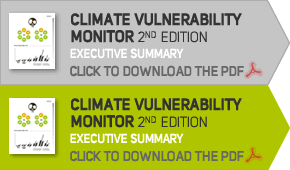
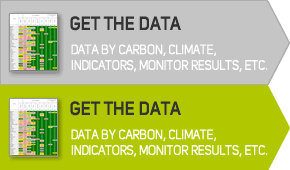
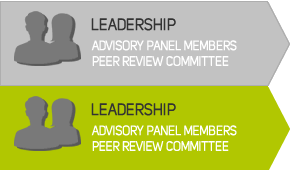
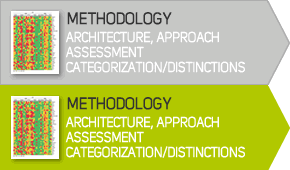
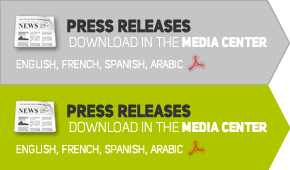


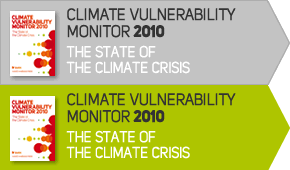

Share this